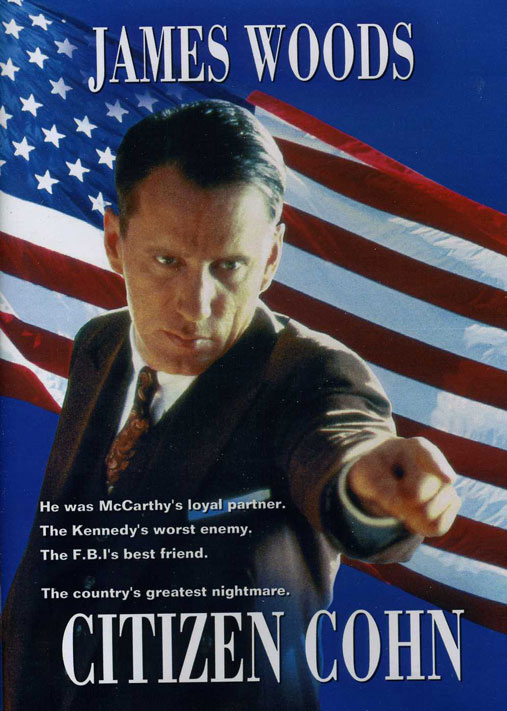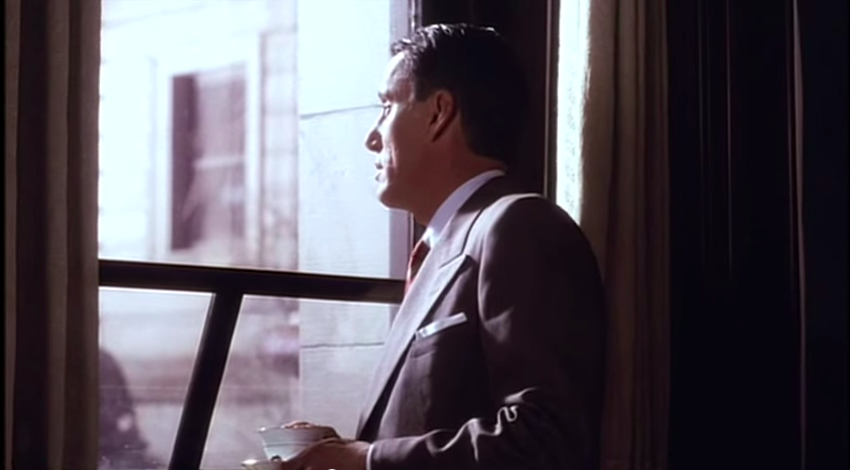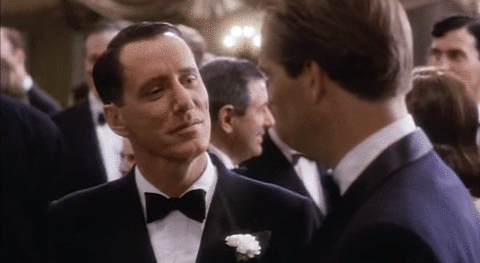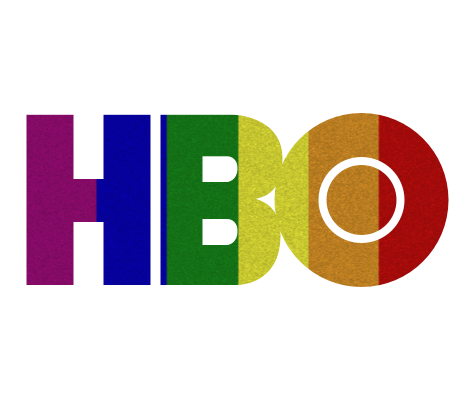Manuel is working his way through all the LGBT-themed films & miniseries produced and distributed by HBO.
Last week we looked at one of the greatest documentaries on the AIDS crisis ever committed to film, Common Threads: Stories from the Quilt (1988), and discussed HBO’s remarkably solid Oscar track record. This week, we enter the 1990s, a time when HBO’s clout when it came to made-for-TV movies was on the rise and when its stronghold on the respective Emmy category would begin: did you know that HBO has won the Emmy for Best TV Movie all but two times since 1993? It’s clearly poised to keep the streak going with yet another LGBT property, Bessie (reviewed).
 Citizen Cohn (1992) [Watch here]
Citizen Cohn (1992) [Watch here]
Directed by: Frank Pierson
Written by: David Franzoni
Starring: James Woods, Joe Don Baker, Joseph Bologna, Ed Flanders and Lee Grant
If you look at the early HBO TV movies you notice they favored (much like Lifetime does nowadays) real-life stories that were provocative in subject matter yet packaged in rather unremarkably-shot films. While the sophistication of historical retellings like John Addams, Recount and Game Change have become banner examples of what HBO Films can produce, its earlier iterations looked more like Citizen Cohn. The film does its homework and relentlessly shows Roy Cohn for the petty, petulant bully he was, both as a member of the McCarthy committee on investigations on Communist activity and as a divorce lawyer in New York. [More...]
But Citizen Cohn's deathbed-beckoning flashbacks frame a not-so-veiled allusion to the film its title apes and its on-the-nose exposition-laden dialogue weigh down what is actually a remarkable performance by James Woods.
The film, perhaps as a symbol both of its time and mirroring the paranoid tone of the historical period covered, never quite spells out Cohn’s rumored homosexuality. The closer the film inches to the moment when Roy finds out he has AIDS (a scene that happens off-screen, the word never quite uttered only implied), the more explicit the film becomes, revealing at last (though again, never in dialogue and only through implication) that most shameful of Cohn’s secrets.
The film is strongest when it obliquely (if a tad didactically) connects Cohn’s work for senator McCarthy with his own homosexuality, something the film presents as an open secret, one which weighs heavily on Cohn himself though clearly not enough to stop him from persecuting his own (whether they be Jewish or gay).

“Just because Lillian Hellman lives with a man, doesn't mean she's not a homosexual. Everybody starts out straight. I've never heard of anyone being born homosexual, have you? Time goes by and sometimes I guess it happens to them without them even knowing it.”
Thus, while the film is keenly interested in Cohn’s ruthless political career, it pauses enough on the way his attachment to one particular young man ended up putting that very same career in jeopardy. In perhaps the best scene in the film, which ably navigates these twinned interests on politics and sexuality, we see Cohn meet and immediately dote on G. David Schine (Jeffrey Nordling), a wealthy heir to a large hotel chain who had begun making a name for himself as an anti-Red campaigner. Woods’s performance, which pitches Cohn as a sleazy salesman who is both much too charming and much too repellent (every laugh he garners is followed by a grimace from the crowd), is most assured in this scene, which finds him trying to ingratiate himself to Schine while needing to present this interest in purely political terms.
 Making gifs of old movies is my new favorite hobby
Making gifs of old movies is my new favorite hobby
Cohn’s relationship with Schine (one which has never been confirmed to be sexual, something the film neither confirms nor denies shying away as it does from ever impinging on the privacy of its central figure) led to the wildly controversial and closely watched hearings on the US Army; Cohn pushed hard to get Schine out of being drafted, angering many higher ups, culminating in the infamous speech that would forever be linked to senator Joseph McCarthy and Cohn himself.
"Have you no sense of decency, sir, at long last? Have you left no sense of decency?"
This sense of decency and lack of shame is precisely what haunts Cohn in his last days at the hospital which see the ghosts of those he’d prosecuted and persecuted haunting him. Pierson (of Streisand’s A Star is Born fame) uses these hallucinatory scenes as further proof of Cohn’s losing battle with AIDS as well as his unwavering commitment to his past wrongs. Yes, they should bring to mind the Ethel Rosenberg/Cohn scenes in Tony Kushner’s Angels in America (which had received its worldwide premiere a year before), though what’s missing here is a clearer point of view: do Pierson and Woods want to craft a sympathetic ending to a monster of a man, or further indict him for his past? There’s something to be said about the film’s unsentimental treatment of Cohn but that final moment, when the film cuts away from Cohn’s (presumed) partner’s teary exit from his hospital room to a title card that reads "Roy Cohn. Disbarred, died of AIDS in 1986. His boat burned and sank in 1980. The IRS confiscated his houses” feels almost cruel though perhaps deservedly so.

Fun fact: Woods' performance was fittingly nominated for a Golden Globe and an Emmy (Hollywood does love an esteemed straight actor slumming it playing gay; we're two years away from Tom Hanks' Philadelphia win) where he was bested by Robert Duvall at the Globes and by Robert Morse (!) at the Emmys. That said, the awards story that year, as we know, was Al Pacino's long overdue walk to the Oscar stage (he also won the Golden Globe for Scent of a Woman). He would win that award again - and the Emmy! - for playing (you guessed it!) Roy Cohn in Kushner's HBO adaptation.
Next week: We look at a different type of government hearings, this time centered on the American government’s inaction on the AIDS crisis in the classic And The Band Played On (available on Amazon Prime & on HBO Go).